高中英语必修四Unit 3 A taste of English humour语言点练习及答案
- 格式:doc
- 大小:68.00 KB
- 文档页数:6
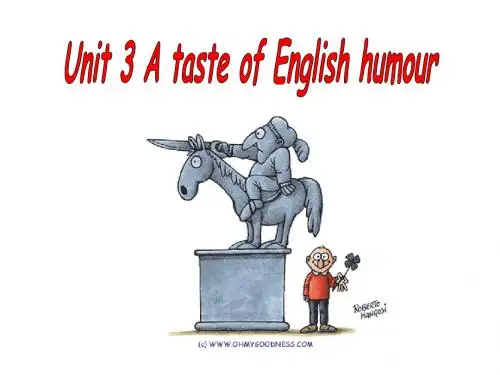
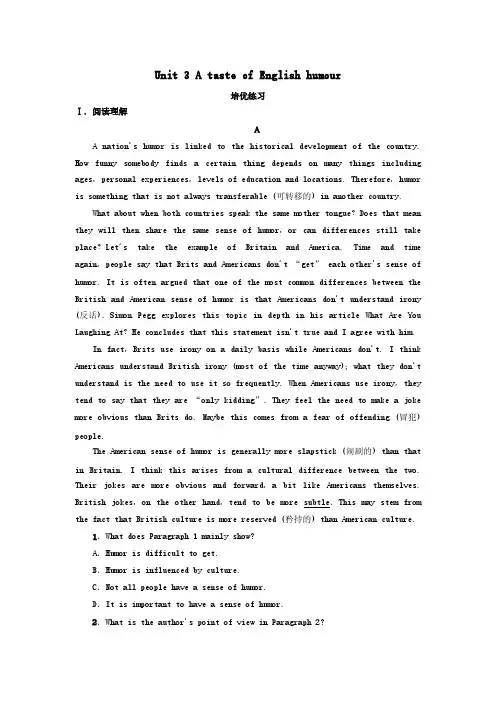
Unit 3 A taste of English humour培优练习Ⅰ.阅读理解AA nation's humor is linked to the historical development of the country. How funny somebody finds a certain thing depends on many things including ages,personal experiences,levels of education and locations. Therefore,humor is something that is not always transferable (可转移的) in another country.What about when both countries speak the same mother tongue?Does that mean they will then share the same sense of humor,or can differences still take place?Let's take the example of Britain and America. Time and time again,people say that Brits and Americans don't “get” each other's sense of humor. It is often argued that one of the most common differences between the British and American sense of humor is that Americans don't understand irony (反话).Simon Pegg explores this topic in depth in his article What Are You Laughing At?He concludes that this statement isn't true and I agree with him.In fact,Brits use irony on a daily basis while Americans don't. I think Americans understand British irony (most of the time anyway);what they don't understand is the need to use it so frequently. When Americans use irony,they tend to say that they are “only kidding”.They feel the need to make a joke more obvious than Brits do. Maybe this comes from a fear of offending (冒犯) people.The American sense of humor is generally more slapstick (闹剧的) than that in Britain. I think this arises from a cultural difference between the two. Their jokes are more obvious and forward,a bit like Americans themselves. British jokes,on the other hand,tend to be more subtle.This may stem from the fact that British culture is more reserved (矜持的) than American culture.1.What does Paragraph 1 mainly show?A.Humor is difficult to get.B.Humor is influenced by culture.C.Not all people have a sense of humor.D.It is important to have a sense of humor.2.What is the author's point of view in Paragraph 2?A.Americans don't get Brits' humor.B.Americans know how to use irony.C.Simon Pegg is professional in using irony.D.Britain and America share the same sense of humor.3.What can we learn about Brits and Americans from Paragraph 3?A.Americans' jokes often offend people.B.Brits' irony is not easy to understand.C.They are different in how often to use irony.D.They are not sure about the need to use irony.4.What does the underlined word “subtle” mean?A.Hidden. B.Funny.C.Obvious.D.Special.BHobbies in general are becoming something of the past. Our lives are already filled with classes,homework,working,relationships and sleeping. When we do have a spare moment,it is all too easy to spend it on the endless entertainment and media that are right at our fingertips.I do not doubt that there are some people who could become a great writer or musician. I only fear that so many people are busy pursuing their education and their careers,but they never even see the potential (潜能) they have. The next great photographer or singer could be going to college right now. But they might not even know they have a gift for photographing or singing if they've never picked up a camera or a guitar.Of course,the final goal of pursuing a new hobby shouldn't be to become rich and famous. For most people,a hobby is just something they enjoy doing for the purpose of the thing itself. Such hobbies are still very useful. Studies have shown that people who have a hobby are less likely to have stress and more likely to have more meaningful lives.Most importantly,a hobby is just something you do to make you happy. I hate to break it to you,but we all have a long lifetime of work and stress ahead of us. It will make things much easier if we can practice the piano or make some collections after work.Sure,it's not easy to start a new hobby while going to school,but it will likely never get easier than it is right now. So think about the thing that youhave always wanted to try but were too embarrassed or busy or whatever. You never know,you might become the world's next great people. If not,you'll at least be a little more well-rounded,more interesting and less stressed.5.What does Paragraph 1 mainly show?A.All people should learn to relax.B.Today's people have little time for hobbies.C.People in the past took their hobbies seriously.D.People's lives have been negatively affected by media.6.What does the author think of hobbies?A.They may take up too much time.B.They can help us enjoy a better life.C.They sometimes can bring us stress.D.They should make us famous one day.7.What does the underlined sentence in the last paragraph mean?A.We should start a hobby now.B.Starting a new hobby isn't easy.C.We'd better develop a hobby at school.D.Developing a hobby will get easier as time goes by.8.What's the author's purpose in writing the text?A.To introduce some helpful hobbies.B.To encourage us to have a hobby.C.To tell us how to create a happy life.D.To tell us how to find our potential.Ⅱ.阅读七选五Having good study habits is key to success in college. 1 To begin making the change,you need to get organized to study.Create a fixed study space. Find a quiet space in your room or somewhere on campus where you can focus. Studying in the same place every day makes your brain combine a certain environment with work. 2Find a regular time for studying. If you study at the same time each day,your brain will be prepared for learning when you sit down. Review your schedule and see when you have free time. 3 You can study during gaps between classes or in the evening after your classes are done for the day.4 Make sure you have everything you need to study at your study space.If you're studying in a place in your home,keep things like your books,pencils,pens,and paper in that area. If you go out to study,you can take a book bag and keep all your studying materials stored there.Avoid distractions (干扰).When you prepare your study space,it's important to keep it away from distractions. Remove any technologies that will take your mind off your work,like your iPad. 5 Besides,keep other distracting materials such as outside reading,away from your study area.A.Organize your materials.B.Start with difficult material first.C.Your room may be an ideal place for studying.D.This will help you quickly get into the state of study.E.Schedule an hour or two for studying during those times each day.F.However,many students find their former study habits are not suitable for college.G.You can also use apps to stop distracting websites like Facebook while you're studying.Ⅲ.语法填空I was only in China for about 4 months last year. I stayed in Shanghai and visited some other cities 1.(include) Beijing. While the price feels a bit too much for a high speed train,the Chinese infrastructure (基础建设) is 2. (true) far ahead of any other developing country and even some developed ones in Europe. The train stations are as big 3. airports:almost everything in 4. (they) is like airports. They have all the high standards of airports but without the waiting time. The trains are just like those from Germany or France,5. are clean,modern and highly developed and run at very high speeds. It is about 1,200 kms from Shanghai to Beijing,and each high speed train 6. (take) around 4 and a half hours to reach its destination and 7. are more than 2 trains every hour,each day.I also had the experience of 8.(sit) in Maglev (磁力悬浮列车) in Shanghai. There is a public maglev train that runs from Shanghai city to its international airport. The 9.(distant) from the city to the airport is 40 kms and the speed of the train is 430 kms/hr. It took us just around 6 mins 10. (cover)40 kms and it felt rather smooth.答案及解析Ⅰ.阅读理解A【语篇解读】 本文为说明文,话题是社会文化类。

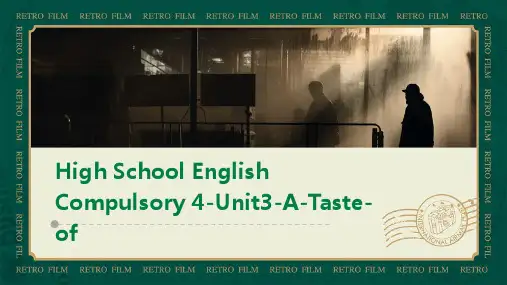

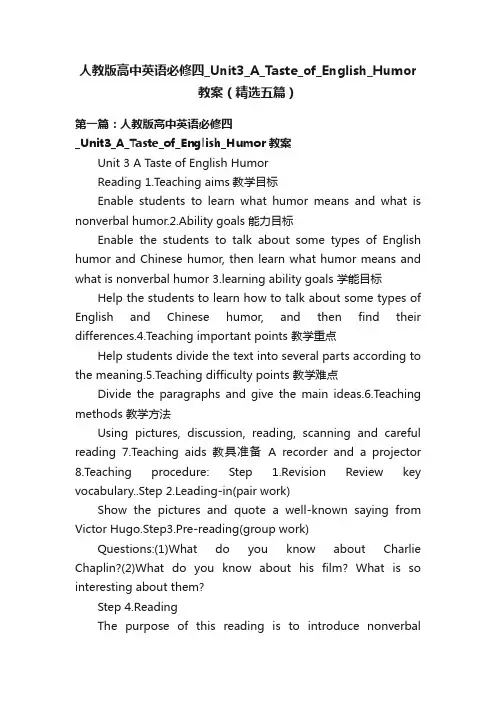
人教版高中英语必修四_Unit3_A_Taste_of_English_Humor教案(精选五篇)第一篇:人教版高中英语必修四_Unit3_A_Taste_of_English_Humor教案Unit 3 A Taste of English HumorReading 1.Teaching aims教学目标Enable students to learn what humor means and what is nonverbal humor.2.Ability goals 能力目标Enable the students to talk about some types of English humor and Chinese humor, then learn what humor means and what is nonverbal humor 3.learning ability goals 学能目标Help the students to learn how to talk about some types of English and Chinese humor, and then find their differences.4.Teaching important points 教学重点Help students divide the text into several parts according to the meaning.5.Teaching difficulty points 教学难点Divide the paragraphs and give the main ideas.6.Teaching methods 教学方法Using pictures, discussion, reading, scanning and careful reading 7.Teaching aids 教具准备A recorder and a projector 8.Teaching procedure: Step 1.Revision Review key vocabulary..Step 2.Leading-in(pair work)Show the pictures and quote a well-known saying from Victor Hugo.Step3.Pre-reading(group work)Questions:(1)What do you know about Charlie Chaplin?(2)What do you know about his film? What is so interesting about them?Step 4.ReadingThe purpose of this reading is to introduce nonverbalhumor.This reading material takes Charlie Chaplin for example.It tells us what nonverbal humor means;what is Charlie Chaplin’s style of acting;how he made a sad situation entertaining and so on.Task 1.Fast-reading Use the information in the passage to complete the notes about Charlie Chaplin.Born: 1889 Job: actor Type of acting:the little tramp Character:mime Died: 1977 Costume :large trousers, worn-out shoes, small round black hat and a walking stick Task 2.Give the main idea of each paragraph Paragraph 1: Why people needed cheering up Paragraph 2: What Charlie’s childhood was like Paragraph 3: What his most famous character was like Paragraph 4: An example of a sad situation that he made funny.Paragraph 5: His achievements Task 3.Careful-reading Let students lfollow the record to read the text carefully , then decide whether they are true or false.If it is false, correct it and find out which paragraph it is.A.Charlie had an easy childhood.Fpara2 B.Charlie’s most famous character, a little tramp was a social success and very popular.F para3 C.Charlie usually made a sad situation entertaining.Tpara4 D.Nobody has been able to do this better than Victor Hugo.Fpara1 E.Charlie has achieved a lot in all his life.Tpara5 Step 5 Post-reading(group work)Give the students some time to discuss.Questions: Besides joy, what else can humor bring to us in our studies and life? Step 6 Homework 1.Finish Exe.3.on Page 19, all exercises on Page 20.2.Try to retell the text.Step 7课后反思:第二篇:人教新课标高中英语必修1Unit2EnglishAroundtheWorld教案Unit 2 English Around the WorldⅠ单元教学目标技能目标GoalsTalk about English and its development, Different kinds of EnglishTalk about difficulties in language communicationLearn to make dialogue using request & commandsLearn to transfer from direct into indirect speechLearn to give opinions and organize ideas by way of brainstormingLearn to make a poster showing your ideas clearly Ⅱ目标语言功能句式Talk about English and its development Refer to Introduction in the teachers’ bookTalk about difficulties in language communicationDifferent speaker may come from different place, so they may use different words and dialect, such as subway-underground、left-left-hand-side、two blocks two streets.Make dialogues using request or command: Pardon? Could you repeat that, please?I beg your pardon? Can you speak more slowly, please? I don’t understand.Sorry.I can’t follow you.Could you say that again, please? How do you spell it, please?词汇1.四会词汇include role international native elevator flat apartment rubber petrol gas modern culture AD actually present(adj.)rule(v.)vocabulary usage identity government Singapore Malaysia rapidly phrase candy lorry command requestretell polite boss standard mid-western southern Spanish eastern northern recognize accent lightning direction ma’am subway block 2.认读词汇Shakespeare Noah Webster Lori dialect Houston Texas Buford Lester catfish 3.固定词组play a role(in)because of come up such as play a part(in)语法Command & requestOpen the door.Please open the door.Would you please open the door? Indirect SpeechHe told(asked)me to open the door.Ⅲ.教材分析和教材重组: 1.教材分析本单元的中心话题是“English language and its development, different kinds of English”.通过对世界英语这一话题的探讨,加强学生对英语语言的了解,对当代语言特别是英语发展趋势的了解.世界在发展,时代在前进,语言作为交流的工具,也随着时代的发展而变化.由于英语在世界上的广泛使用,它不断地吸收、交融、容纳、创新,这就形成了各种各样带有国家、民族、地区特色的英语.没有人们认为的那种唯一的标准英语。
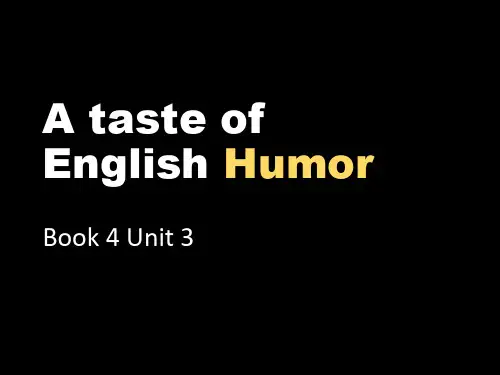

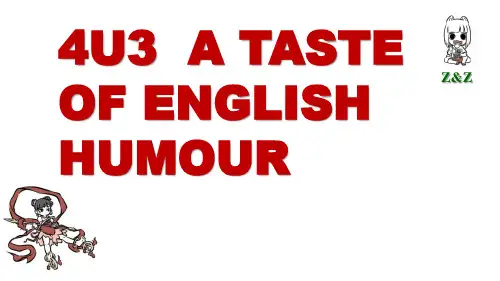
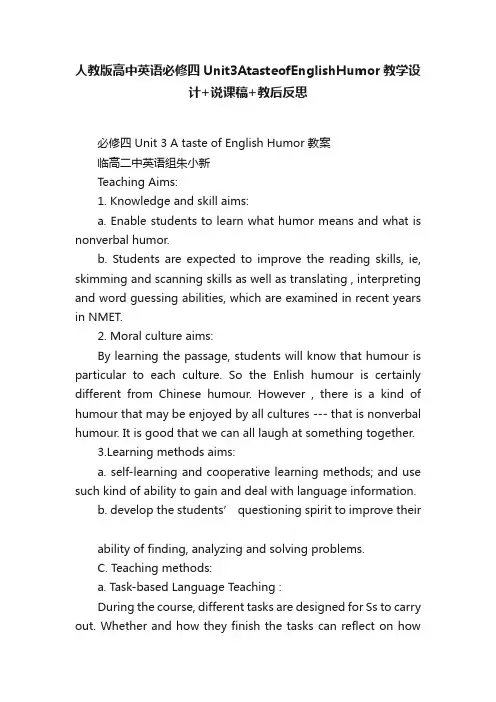
人教版高中英语必修四Unit3AtasteofEnglishHumor教学设计+说课稿+教后反思必修四 Unit 3 A taste of English Humor 教案临高二中英语组朱小新Teaching Aims:1. Knowledge and skill aims:a. Enable students to learn what humor means and what is nonverbal humor.b. Students are expected to improve the reading skills, ie, skimming and scanning skills as well as translating , interpreting and word guessing abilities, which are examined in recent years in NMET.2. Moral culture aims:By learning the passage, students will know that humour is particular to each culture. So the Enlish humour is certainly different from Chinese humour. However , there is a kind of humour that may be enjoyed by all cultures --- that is nonverbal humour. It is good that we can all laugh at something together.3.Learning methods aims:a. self-learning and cooperative learning methods; and use such kind of ability to gain and deal with language information.b. develop the students’ questioning spirit to impr ove theirability of finding, analyzing and solving problems.C. Teaching methods:a. Task-based Language Teaching :During the course, different tasks are designed for Ss to carry out. Whether and how they finish the tasks can reflect on howmuch information they grasp from reading. In return, the teacher can adjust his/her teaching.b. Cooperative Learning:Divide the class into small teams, each with students of different levels of ability. Every member of a team is responsible not only for learning what is taught but also for helping teammates learn, thus creating an atmosphere of achievement.D. Important and difficult points.a. Help students learn how to understand and enjoy English humors.b. Help students know the differences between English and Chinese in humor.E. Teaching aids:Multi-media pictures blackboardTeaching procedures:Step one: Lead-in and Warming up( 5 mins)In order for students to get into the topic of humor quickly and smoothly, a piece of sketch video “Eating noodles”by Ch en Peisi will be played for the students.Question: Do you know who the Chinese comedian is ?( Chen Peisi)What makes his performance funny? ( his body gestures)Then show some pictures of Charlie Chaplin to students.Questions: Do you know who he is ?What do you know about Charle Chaplin?What do you expect to learn about from this reading? ( students’ answers may vary)Step Two: Reading ( 22 mins)Fast Reading ( Skimming) (7 mins)Task 1: Fast Reading (3 mins)What’s the passage mainly about?A. The history of English humor.B. The films Chaplin made.C. The life and humor career of Charlie ChaplinD. The Gold Rush in California. ( Key : C )Task 2: Read to summarize the main idea of each paragragh and match the paragraph with its main idea. (4 mins) Para 1: (E ) A. His achievementsPara 2: (C ) B.An example of a sad situation that he made funny.Para 3: ( D) C. What Charlie’s childhood was like.Para 4: ( B ) D. What his most famous character was like.Para 5: ( A) E. Charlie Chaplin brightened the people’s lives through two world wars and the hard years in between.Scanning: Reading for details ( 15 mins)Task 1: Read the passage again and then fill in the chart. .Notes on Charlie Chaplin’s careerBorn 1889Died 1977Job ActorFamous Character “ the tramp”, a poor and homeless personCostume Large trousers, worn-out shoes and small round black hatReason for success Charming, social failure with a determination to overcome difficulties and always kind Task 2: Work in pairs to read for difficulties.1. Exp lain in your own words the sentence “Charlie brightened the lives of American and British through two world wars”.2. Why was“The Little Tramp ”loved by many people around the world?A. Because the appearance of the character is so funny.B. Because the tramp is a social failure.C. Because he is always made fun of by others.D. Because of his optimism and determination fo overcome all difficulties.3. Find a sentence in the passage similar in meaning to the following one:Charlie’s real life was not so com fortable as it was showed in his films.4. Translate the sentence into Chinese “You may find it astonishing that Charlie was taught to sing as soon as he could speak and dance as soon as he could walk”.5. Guess the meaning of the word “convincing” in line 30Page 18.Step Three : Retelling (5 mins)People may laugh at others_______ on a banana skin, or falling down a hole, for it makes them _______ with themselves seeing others _______ _______ than themselves.As an outstanding humourous actor, Chaplin could always _______ in the people deep feelings by using _________ forms of acting in the time of silent films. His charming _________ “the little tramp” is well-known all over the world, a poor and _________ person wearing large trousers, ________ shoes, and carrying a walking _______.A social _______ as he was, he was loved by all the people for his ____________ in overcoming difficulties and being kind to people _______ to him. When playing the famous film The Gold Rush, Chaplin managed to make the sad situation—eating a_______ shoe, entertaining by using __________ humour.Such is Charlie Chaplin who produced, _______ , and wrote the movies that he _______ in. He was given a special Oscar for his lifetime work ____________ of bringing humour to us all.Step Four: Pair work. ( Enjoying 4 mins)Part 1:JOKE 1Wife talking to her husband (who reads newspaper all day): I wish I were a newspaper so I'll be in your hands all day.Husband: I wish that too, so I could change you dailyJOKE 2TOM'S EXCUSETeacher: Tom, why are you late for school every day?Tom: Every time I come to the corner, a sign says, "School-Go Slow".Part 2:Show the students some pictures of nonverbal homour to let them appreciate . (omitted)Step Five: Interview ( Group activity 8mins)The students are divided into groups of 4 . Then in each group students will take their turns to be Charlie and the other 3 act as reporters to interview him/her using the information from the reading.Step Six: Home workFind more information about Chaplin through The Internet or from books and you are expected to present it to your classmates in the next class.必修四 Unit 3 A taste of English Humor说课稿临高二中英语组朱小新Understanding of the lesson本课选自人民教育出版社出版的普通高中课程标准实验教材,高一年级必修四的第三单元Ataste of English humour。

: Unit 3 A Taste of English Humor(一)教案【教课目】通借助本元第一上所学的,正确地理解知目(reading)部分的内容,使学生感觉英风趣的内涵。
能力目化技术,提高学生能力。
感情目使学生能培育必定的风趣感,保持的人生度。
【要点点】要点:利用所学,正确梳理文内容并能有效地从文中合适的信息理。
点:怎样在有限的内学生的技巧与能力。
【前】1.写出下边:1) _____________n喜.2)__________ adj.平时的 ;一般的3)_________prep. 遍及adv. 到4)____________n.刻;合5)_________adj.无家的 ; 无家可的6)___________vt.&vi. 嚼碎 ; 咀嚼7) _________n.姿;手vi. 做手8)___________adj.突出的 ; 优秀的9)___________n皮.革10)__________n.耳 vt.&vi. 低11)_________adj.的12)___________n. 失( 者 )13)__________n女.演14)_______ vt.&vi. 演 adj.直的15)____________adj特.殊的 ;特的16)__________vi.作出反;回二、依据意思写短:1)_______________直到在2)_________________⋯⋯ 足3)______________的;缺乏的4)______________挑出;辨出5)______________切断;断6) ______________担当主角;主演三.词典写出以下的英风趣家或作家及英风趣的型。
Types of humour:_____________Nonverba_______mime________Charlie Chaplin__________Mr Bean_________Verbal______jokes_________funny stories____________funny poems_________comedy__________Mark Twain _____________ Edward Lear_____________【合作研究】1.Fast-reading 迅速文,达成以下表格。
Unit 3 A taste of English humorTeaching aims:TopicDifferent types of humour; a taste of English humourUseful words and expressions:Nouns: slide, skin, content, particular, failure, difficulty, boil, snowstorm, bottom, mouthful, Switzerland, swing, pancake, whisper, sense Verbs: slide, content, astonish, entertain, overcome, boil, chew, direct, star, swing, whisperAdjectives: cruel, content, particular, homeless, worn-out, fortunate, bottom, direct, outstanding, mountainous, vastAdverb: throughout, fortunately, directExpressions: be content with, be badly off, be worn out, pick out, cut off, star in, knock intoFunctional items:1. Expressing anxietyWhat’s wrong?What’s the matter with you?Is there anything wrong?2. Expressing surpriseReally?Oh dear!Is that so?Good heaven!3. Expressing pleasureI’m glad /pleased/ happy to…That’s nice /wonderful /great.GrammarThe –ing form as the predicative, attribute and object complementTheir job is “panning for gold”.That was the problem facing Charlie Chaplin.He sat down at the table with his plate and drinking cup.Do you find it funny to see someone sliding on a banana skin, bumping into someone else round a corner, or falling down a hole in the road?Teaching proceduresPeriod 1 ReadingStep 1. Warming upDiscuss:How many kinds of humor can you think of in your daily life?Types of humor:English humor Chinese humorNonverbal pantomime (哑剧)Mime and farce funny playsVerbal jokes cross talk (相声)Funny stories funny storiesFunny poems doggerel (打油诗)What’s the difference between jokes and humors?Can you name out some of the humorous actors you like?Background knowledge:mime 笑剧 farce 滑稽剧 comedy 喜剧 tragedy 悲剧 opera 歌剧TV play 电视剧 humor 幽默 joke 笑话 circus 马戏团 clown 小丑sketch 小品 cross talk 相声Step 2. ReadingTask 2: Ss read and answer the following questions:What’s the passage mainly about?The history of English humor.The films Chaplin made.The humor Chaplin made in his film.The Gold Rush in California.How many parts can the passage be divided into?A. 2B. 3C. 4D. 53. People enjoy seeing other people’s bad luck because _______.A. they enjoy doing soB. it makes people more worried about their lifeC. it makes people more content with their lifeD. there’s much fun in doing so4. Chaplin was given a special Oscar for __________.A. the characters he played in his filmsB. the films he directedC. the joy he gave us in his filmsD. the contributions he made in filmsTask 2: Ss read and fill the following chart:Step 4. After- readingTask 3: Ss in groups and discuss:What should we learn from Charlie Chaplin?Do you want to be a humorous person? And how can you be humorous?What should we do to get success?Period 2. Language learningStep 1. RevisionSs retell the text with their own words.Step 2. Language pointsfind /think/ feel it + adj./n + to do sth.We find it important to learn English well.I feel it a great honour to be invited to the party.2. see sb. doingSee sb doSee sb doneWe saw him stealing the book from the bookstore just now.He saw Tom go out of the classroom yesterday afternoon.His neighbour saw him often beaten by his father.3. skinThe purse is made of crocodile skin.be all skins and bones 瘦的皮包骨头4. be cruel toDon’t be cruel to animals.It is cruel of sb. to do sth.It’s cruel of America to bomb Iraq.5. feel /be content with sth,be content to do sth.People of the city feel content with their life.Mary is content to sit in front of the television all night.6. be worse offbe bet ter off7. astonish sb. with sth.to the astonishment of sb.be astonished at sth./ to do sthHe said he could astonish us with a good result in the final exam. To the astonishment of the teachers, he got the first in the competition. The teachers were astonished at his getting the first in the competition. The teachers were astonished to find that he got the first in the competition.8. worn-out : adj. 穿破的Worn out vt. vi 使…耗尽; 穿破/旧,Cheap socks wear out quickly.I am worn out by the hard work.9. failure un.失败 cn. 失败的人或事His plans ended in failure.As a writer, he was a failure.10. be loved by sb. for sthDeng Xiaoping is loved by the Chinese for his great contribution to China’s construction and social reform.11. star in : 担任主角This is an old film starred in by Charlie Chaplin.12. knock intoHe walked in such a hurry that he knocked into an old lady in the street. Step 3 Learning about languageSs do part 1 of the discovering useful words and expressions.Ss finish part 2, 3 and 4.Step 4. Practice1. Ask the Ss to do Ex. 1and 2 on page 63.2.Do Ex 3 on page 64Period 3. ReadingStep 1. Pre-readingThe purpose of this reading is to introduce students to English jokes. Two kinds of jokes are shown here. The first shows now different meanings can make something amusing. This is called a “play on words”. The second kind of joke is s short funny story. Both jokes are very popular in English-speaking countries.Step 2. ReadingTask 1: Ss read and give their own answer to the question.Answer key for Exercise 1:1. B2.C3. ATask 2: Ss read part 2 and give their own answers to the two questions.Step 3. Reading task (page 59)This reading gives Ss an opportunity to appreciate that not all special days are serious and some can be fun. April Fool’s day is a day when people play jokes on each other. The story told here is an example of a really good joke which many people in England believed.Task 3: Ss read the passage and answer the following questions.What do children usually do on April Fool’s Day?Why did people believe the programme Panorama?Do you think the advice that the BBC gave people who asked how to grow noodle trees was serious? Give a reason.What would you do to find out whether a story like this was true.Task 4: Ss read and analyse the way that the BBC played this trick.Suggested answer:The panorama TV programme is serious and people believe it.The progrmme itself was presented in a very serious way.There were many details given in the story to make it believable.Task 5: Ss read and think if these things are true:that pigeons follow roads and road signs when they find their way home. that the earliest football has been found in a grave dated to 1000 years ago.that earliest human paintings on cave walls are all modern fakes.that advanced computers can “talk”to each other without the aid of humans.Period 4. Listening and speakingStep 1. Warm upAsk one of the Ss to tell the class a joke.Step 2. Pre-listeningThis is a story that English speaking people find funny. It is the kind of story that might happen to anybody who has a farm and chickens. At first let Ss read the questions to make sure that they know what they should do in this listening.Step 3 ListeningTask 1: Ss listen to the tape twice and finish Ex 1 and 2 on page 23.Step 4. SpeakingTask 2: Ss in pairs think of a funny story. It can be an English story or a Chinese story. Follow the following procedure:Prepare a joke and tell your partner in English.While telling your story, use the expression on your face and some acting to help make the story as funny as you can.After telling your story to your partner, let him/her give you some advice. Then let your partner tell his/her story.Finally tell your story to the class.Step 5. Listening (on page 55)This is a funny story for the students to enjoy. Ss should listen carefully and first try to understand the meaning.Task 3: Ss listen to the tape twice and finish Wb Ex 1 and 2 on page 55. Task 4: TalkingHumour make people laugh, feel happy and relaxed. Sometimes one person may find something funny while another person doesn’t find it amusing at all. So in pairs discuss with your partner what makes you laugh. Try to use the following expressions:I enjoy this very much because….It surprises me that …I laugh at that kind of thing because…This is fun because…I’m pleased we were both amused at…It is very amusing that…How wonderful /surprising!Period 5. Grammar:Step 1. Warm upReview what the Ss have learned about –ing as the subject and ObjectStep 2. The –ing form as predicative, attribute and object complement PredicativeSeeing is believing.The music is exciting.AttributeThere is a swimming pool in our school.China is a developing country..The person translating the songs can speak seven languages.The boy standing there is a classmate of mine.Object complementWe heard her singing in her room.You can see them performing every night this week at the new theatre. We watch the children diving into the water from the diving board.Step 3. PracticeSs finish Ex 2 ,3and 4 on page 21.Ss do Wb Ex 1 and 2 on page 56.Choose the suitable words from the box below and fill in the blanks in the correct form:1). I can’t imagine Bill________ a motorbike.2). Did you hear the dog downstairs _______ for most of the night?3). Frank is very good at telling funny jokes. He can be very ________.4). You can’t stop me _________ what I want.5). He gave me a ________ hug when he met me at theairport.6). Jim has really learnt very fast. She has made ________ progress.7). It’s been raining all day. This weather is __________.8). When I came out of the theatre, I noticed a group of children _________ musical instruments across the street.Keys:1). riding 2). barking 3). amusing 4). doing5). welcoming 6). astonishing 7). depressing 8). playingPeriod 6. WritingStep 1. Pre-writingThis exercise lets students to write a funny story.Task 1: Ss gather information that they need and plan what they want to write.Step 2. While-writingTask 2: Ss write an English funny story or a Chinese one.Writing tips:Ss make a planSs write down their story in a logical order:First … Then …. Next…. Finally / At last…For each part of the story try to find the most interesting words you can to describe how you felt or what was happening.Then write out your story using these interesting words.Read through your story.Then show it to your partner. Let him/her suggest some new and exciting words.Help your partner with his/ her story.Write out the story and put it into a class collection of stories.。
重点句型(必修 4 Unit 3 A taste of English humor)(讲义)高中英语重点句型(必修 4 Unit 3 A taste of English humor)1. 学习句型,理解句型的含义。
2. 正确地运用句型,并能灵活地用于作文。
3. 掌握并能够熟练运用非谓语动词作结果状语的用法。
重点:1. As Victor Hugo once said,“ Laughter isthe sun that drives winter from the human face,” and up to now nobody has been able to dothis better than Charlie Chaplin.正如维克多·雨果曾说过:“笑是阳光,能驱赶人脸上的寒意”,直到现在为止,没有人能比查理·卓别林更好地做到这一点。
2. Unfortunately his father died,leaving thefamily even worse off,so Charlie spent his childhood looking after his sick mother and his brother.不幸的是他的父亲去世了,使得他的家境更加艰难,因此,卓别林童年时期都在照顾他生病的母亲和弟弟。
3. Then he picks out the lace of the shoe andeats it as if it were spaghetti.然后他挑出鞋带来吃,像吃意大利面条一样。
难点:as与which引导的非限制性定语从句的用法及区别。
【句型学习】笔。
as,which(1)as引导的从句可置于主句前,而which 则不能。
(2)as引导的从句,有“正如……”之意,而which则没有。
(3)当先行词被so, such, the same(指同样的两个,若指同一个,关系词则用that)所修饰,或such, the same本身就是先行词时,关系代词用as,不用which。
BOOK 4 Unit 3 A taste of English humour1. Are you c________ with your life?2. His stepmother is so c________ to him that he often dare not go home.3. F________ is the mother of success.4. Can the o_________ scientist win the national prize for science?5. Tom is jobless, penniless and h_________ .6. We should try our best to _________ (克服) all difficulties.7. There are _________ (直达) trains between Beijing and Shanghai.8. She _________ (耳语) a warning to me and then disappeared.9. With a _________ (满口) of rice, he could hardly say anything.10. The monkey is _________ (荡来荡去) itself from tree to tree.二、短语翻译1. 撞在……身上____________________2. 对……感到满意____________________3. 出身贫寒____________________4. 十九世纪中叶____________________5. 主演____________________6. 挑选____________________7. 切断____________________8. 奥斯卡特别奖____________________9. 再次____________________10. 露天____________________三、句型转换:1. The person who is writing on the blackboard is Tom.The person ________ ________ ________ ________ is Tom.2. It is funny to see that someone is sliding on a banana skin.It is funny to see ________ ________ on a banana skin.3. It‟s his job to clean the square once every three hours.________ ________ ________ once every three hours is his job.4. Chaplin got a special Oscar for his lifetime outstanding work.Chaplin got a special Oscar for his lifetime work ________ ________ _________.5. You should finish the work at the end of this month._______ _______ _______ at the end of this month is your task.焦点透视1. particular adj. 单独的,特殊的,特定的,个别的,特别的,值得注意的,与众不同的in particular 特别的particularly adv. 特殊的,特别的be particular about…对……挑剔,对……讲究special adj. 专门的,特殊的,特别的。
强调的是事物特有的性质、性格或专门的目的、用途。
especial adj. 特别的,主要的,突出的。
强调的是重要性,有“优越、好感”之意。
particular adj. 特别的,讲究的,挑剔的。
强调特定的,个别的,与众不同的。
用适当的词填空:(1) He likes the country, _______ in spring.(2) We came here ________ to see you, our friend.(3) It has been _________ hot this week.(4) It is ____________ fine today.单项填空:(5) It‟s always difficult being in a foreign country, _________ if you can‟t speak the language.A. extremelyB. naturallyC. basicallyD. especially(6) The fashionable lady is ________ about clothes.A. specialB. particularC. carefulD. strict2. imagine vt. 想象;想;设想vi. (用于插入语或感叹句中)想象,幻想imagination n. 想象,空想,想象的事物,想象力,听觉imaginative adj. 富于想象力的image n. 像;印象;映象imaginary adj. 想象中的;假想的;虚构的imaginable adj. 可想象的,可能的imagine sth. 想象……imagine sb. doing sth. 想象某人做……imagine sb. to be…想象某人是……beyond imagination 难以想象单项填空:(1) I can hardly imagine Peter _________ across the Atlantic Ocean in five days.A. sailB. sailingC. to sailD. to have sailed完成句子:(2) Don‟t imagine yourself __________________________(总是正确的).(3) She __________________________ (幻想自己是个科学家).(4) You can ________________________ (想象一下那里的情况).(5) I can imagine __________________________ (生活在美国).(6) I imagine ________________________ (你是对的).3. explain v.说明;阐明;解释;辩解explanation n. 解释,解说,说明explainable adj. 可解说的explain away 把……解释过去explain oneself 说明自己的意图,为自己辩解explain 后不能接双宾语,即不能用explain sb. sth. 结构,但可以用explain sth. to sb.。
(1) At the press conference, the officer didn‟t explain __________.A. them the cause of the murderB. them of the cause of the murderC. the cause of the murder to themD. the cause of the murder for them(2) --- I failed again!--- Why not explain _______ you have done your best?A. himB. him thatC. thatD. to him4. be angry about 因某事而生气be angry to 由……而生气be angry with 对……发怒be angry at因某事而生气用适当的介词填空:(1) She is angry ________ me.(2) He was angry ________ her answer.(3) He was angry ________ hear that5. break down 使崩溃;毁坏,放弃抵抗;屈服;失效;没用了,break into/in破门而入;突然发生break up (关系)破裂;驱散(人群)break out 火灾、战争突然发生break down (机器)出故障;(人)身体出毛病break off 折断(树枝);停止(工作)break through 突破(障碍);穿越……(1) News reports say peace talks between the two countries ________ with no agreement reached.A. have broken downB. have broken outC. have broken inD. have broken up(2) The ice will ________ when the weather becomes warm.A. break upB. break downC. break offD. break away动名词作表语和定语自主测试1. I won‟t have you to your mother like that.A. to talkB. talkingC. talkD. talked2. almost 50 jin, the box was lifted by Wang Ping alone.A. To weighB. WeighedC. WeighingD. To be weighed3. I can‟t understand without saying goodbye to me.A. you leavingB. you to leaveC. for you to leaveD. you leave4. I really appreciate to help me.A. your offeringB. for you to offerC. of you to offerD. for your offering5. He heard the noise of the vase .A. brokenB. being brokenC. to be brokenD. broke6. I was surprised at the task so soon.A. his completedB. his having completedC. his having completingD. him completed7. The thief ran so fast that he missed .A. catchingB. to be caughtC. being caughtD. to catch8. Seeing is .A. believingB. to be believeC. to believingD. being believes9. Our greatest pleasure is .A. readingB. to readC. to be readingD. being reading10. is easier than .A. Talking , to doB. To talk , doingC. Talking , doingD. Talking , done完型填空One day newly-wedded Nancy lost her ring while helping to plant potatoes. Friends were 1 and the field wassearched long but in vain. 2 , when the potatoes were harvested, 3 one looked out for the ring but it 4 lost. Another year came round and all the 5 working in the field kept their 6 open. The following year was 7 . And year after year, whoever had business in the 8 always had Nancy‟s 9 in his mind.Then the 10 changed hands but it went 11 farther than to cousins. So the 12 of lost ring remained alive 13 thirty-eight years had passed. They came a 14 day when a man was ploughing the field 15 a pair of horse. Even after thirty-eight years he 16 looked out for the ring, and 17 just which part of the field Nancy had lost it in. At this time, when he came there, he 18 it. He picked it up, put it carefully into his pocket, 19 his horses, and ran all the way down to the village and placed it in Nancy‟s 20 .1. A. come B. called C. invited D. collected2. A. Later B. However C. But D. Finally3. A. all B. any C. every D. no4. A. got B. had C. remained D. was5. A. farmers B. friends C. men D. wives6. A. bags B. hands C. mouths D. eyes7. A. not there B. the same C. not the same D. changing8. A. field B. market C. home D. house9. A. hand B. ring C. thing D. potato10.A. ring B. farm C. home D. farms11.A. any B. not C. 不填 D. no12.A. memory B. thing C. matter D. hand13.A. for B. because C. until D. when14.A. summer B. spring C. fine D. rainy15.A. with B. beside C. behind D. before16.A. not B. no C. still D. had17.A. knew B. forget C. realized D. saw18.A. lost B. found C. looked for D. saw19.A.brought B. taking C. left D. forgetting20.A. bag B. house C. pocket D. handADifferent Nations, Different CulturesEach nation has its own customs and way of life. For example in some Asian countries, a guest takes off his shoes before entering a house. But this is not done in European countries, even if shoes sometimes become very muddy. A guest in a Chinese house never finishes a drink. He leaves a little to show that he has had enough. So does a guest in a Malay house. He always leaves a little food. In England, however, a guest a1ways finishes a drink to show that he has enjoyed it.In some Asian countries, such as China, people eat with chopsticks. In other countries, people pick up food with their fingers. In many parts of the wor1d, people sit on chairs at tables when they eat their meals. But in some parts of the world, such as Japan, most people sit on the floor to eat, rest on cushions, or squat on their heels. In many countries,' pork is a popular kind of meat. But in Islamic countries people do not eat pork because of their religion. For the same reason, in some places in Asia, such as India, many people do no eat beef, whi1e in other places of the world, many people are fond of eating beef.There are more than five billion people on Earth. They have different customs and ways of life.They judge the world from their own society's way of looking at things.Choose the best answer:l) When a guest visits a house in some Asian countries, he ______ before entering the house.A. takes his shoes in his handB. lifts his shoes from the floorC. 1eaves his shoes outside the doorD. picks up his shoes from the ground2) When visiting a Malay home, a guest which is served by the host.A. always finishes the foodB. always eats a little of the foodC. never leaves any of the foodD. never eats up al1 of the food3) A guest in an English home always finishes a drink to let the host know that he _____.A. has enjoyed itB. is very thirstyC. wants some more of itD. has had enough of it4) ________, most people sit on the floor when they eat their meals.A. In ChinaB. In JapanC. In EuropeD. In England5) In India, many people do not eat beef because of _________.A.their religionB. their way of lifeC.their dislike of beefD. their lack of cowsBFrank Somithson woke up and leaned over to turn off the clock. “ Oh no !” he thought to himself. “ Another day at that office : a boss who shouts at me all the time .”As Frank went downstairs his eyes fell on a large brown envelope by the door . He was overjoyed when he opened it an d read the letter inside . “ Bigwoods Football Pools(足球赌博公司)would like to congratulate you . You have won half a million pounds .”Frank suddenly came to life. The cigarette(香烟) fell from his lips as he let out a shout that could be heard halfway down the street .At 11:30 Frank arrived at work . “ Please explain why you‟ve so late ,” his boss said. “Go and jump in the lake , ” replied Frank .” I …ve just come into a little money so this is goodbye. Find yourself someone else to shout at . ”That evening Frank was smoking a very expensive Havana cigar (雪茄) when a knock was heard on the door . He rushed to door. Outside were two men , neatly dressed in grey suits. “ Mr Smithson , ” one of them said, “ we‟re from Bigwoods Pools. I‟m afraid there‟s been a terri ble mistake. ---- ”1.What do we know about Frank ?A He was a lazy man. B. He was a lucky man.C. He didn‟t make a lot of money .D. He didn‟t get on well with his boss.2.When he heard the knock at the door, Frank probably thought _____ .A.someone had come to make an apologyB.someone had come to give him the moneyC.his friends had come to ask about the football poolsD.his friends had come to congratulate him on his luck3.On hearing “ ----- there‟s been a terrible mistake ---- ” Frank was most likely to be _____.A. disappointedB. worriedC. nervousD. curious答案一、单词拼写:1.content2. cruel3. Failure4. outstanding5. homeless6. overcome7. direct8. whispered9. mouthful 10. swinging二、短语翻译:1. knock into2. be content with3. born in poverty4. in the middle of the 19th century5. star in6. pick out7. cut off 8. Special Oscar 9. a third time 10. in the open air三、句型转换1. writing on the blackboard2. someone sliding3. Cleaning the square4. which was outstanding5. Finishing the work(Learning in Context)1. (1) especially/ particularly (2) specially (3) especially/ particularly (4) especially/ particularly (5) D (6) B2. (1) B (2) to be always correct (3) imagines herself to be a scientist (4) imagine the situation there (5) living in America (6) you‟re right3. (1)C (2)D4. (1) with (2) at (3) to5. (1)A (2)A自主测试(Self-testing)1~5 BCAAB 6~10 BCAAC*完型填空1~5 BACCA 6~10 DBABB 11~15 DACBC 15~20 CABCD*阅读理解A: 1~5 CDABA B: 1-3: DBA。